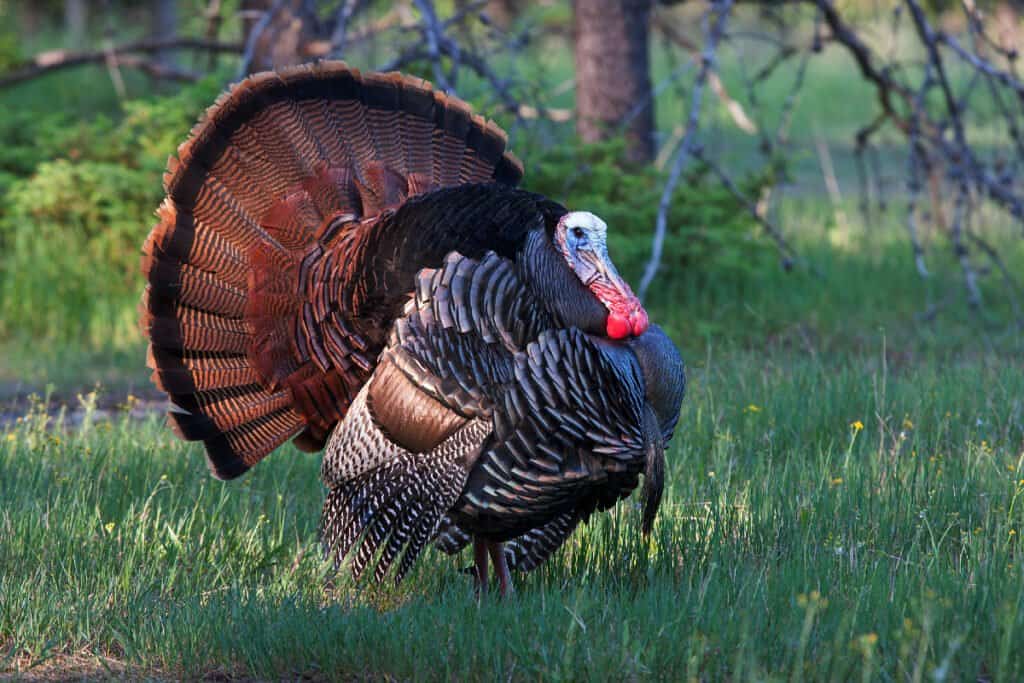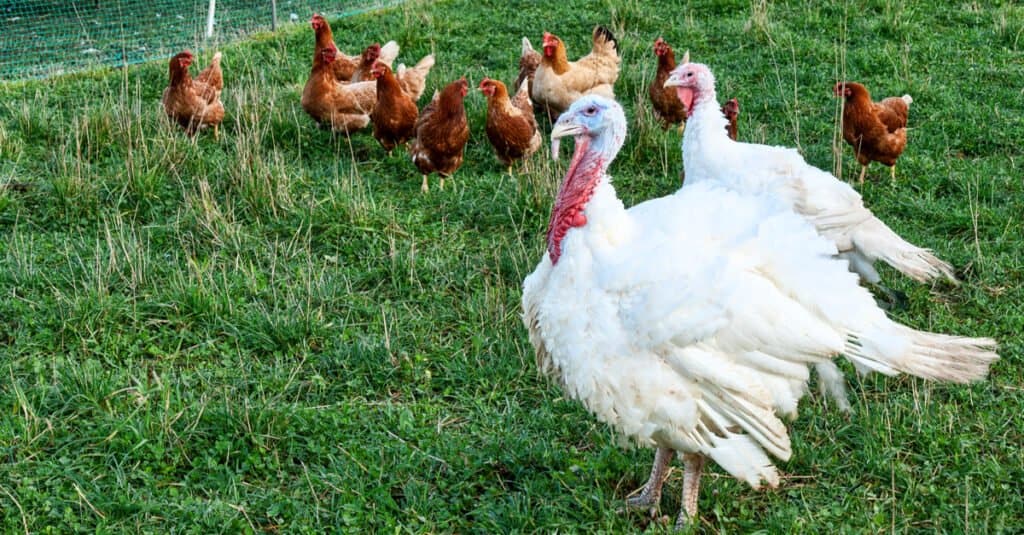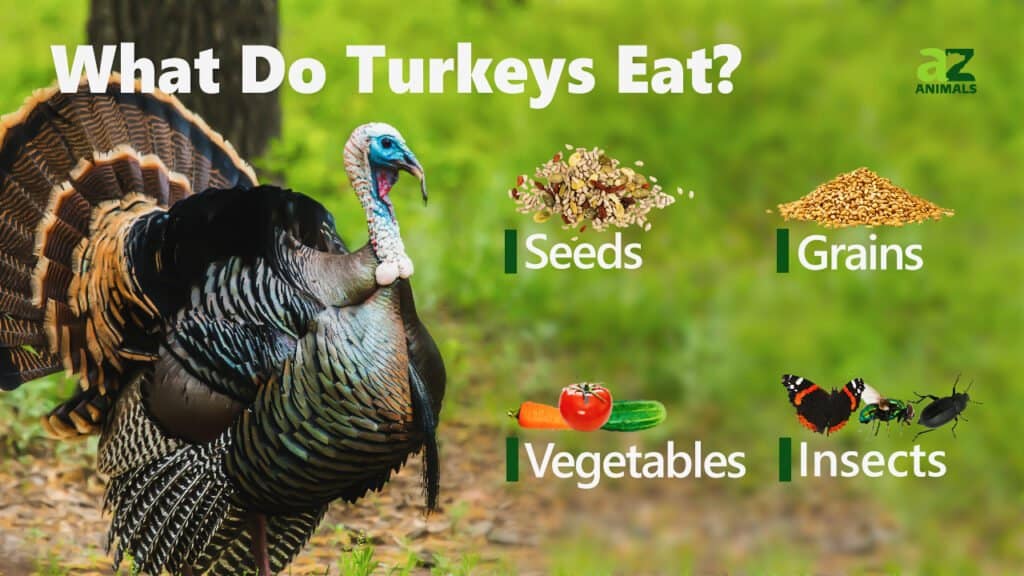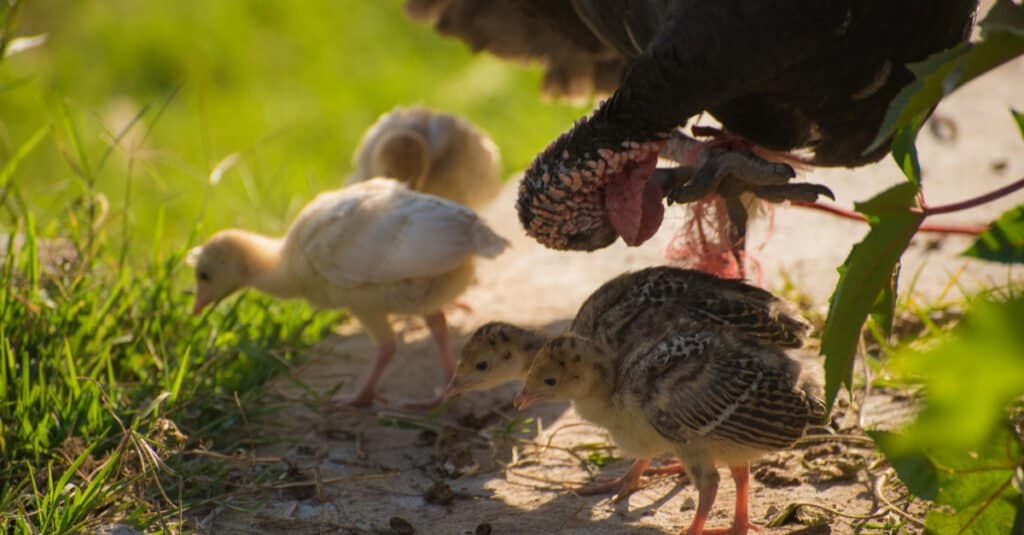Turkeys have long been useful livestock animals, but in recent years, they’ve also become popular pets! They’ve been domesticated and living alongside humans for thousands of years, and they’re highly intelligent and social animals. But do turkeys make good pets, and are they the right pets for you?
Read on as we explore the practice of keeping turkeys as pets, why hobby farmers have such a soft spot for them, and what they need to be happy and healthy in captivity.
Turkeys in Captivity: A Brief History

Humans and turkeys have a long history of living alongside one another.
©Jim Cumming/Shutterstock.com
Turkeys are large, heavy-bodied ground-feeding birds within the Galliformes order. Notably, this group also contains chickens, quails, pheasants, and guineafowl. More specifically, turkeys belong within the Meleagris genus. There are two species within this genus, the wild turkey, Meleagris gallopavo, and the ocellated turkey, Meleagris ocellata.
The wild turkey’s more recent descendant, the domestic turkey, Meleagris gallopavo domesticus, was domesticated thousands of years ago, hence the distinction between the two (despite them technically being the same species). Originally, turkeys were domesticated in Mexico before they quickly spread to Europe, the rest of the Americas, and, eventually, the rest of the world. They were introduced to the UK in the 1500s.
The main reason turkeys were domesticated initially was to be used as livestock for their eggs and meat. Aztec and Mesoamerican peoples also used their large, ornate feathers for decorations. Turkeys quickly proved to be very inexpensive to care for and house in captivity. They produce a lot of meat for their size, and they breed easily as well.
By the 20th century, Europeans had widely domesticated the turkey and even developed various unique breeds. Though turkey meat was more of a luxury for many years, in the 1940s, farming practices became much cheaper and more efficient. This greatly reduced the costs associated with farming them, making turkey meat a staple food throughout the Americas and Europe.
In more recent years, turkeys have become very popular as pets amongst hobby farmers. Rather than utilizing them for meat, eggs, or even feathers, many people now keep turkeys solely as entertaining, beloved pets.
Can Turkeys Make Good Pets?

Because they are so docile and friendly, turkeys can peacefully live amongst chickens and various other types of livestock.
©iStock.com/arnphoto
Turkeys make excellent pets, provided you can provide them with ample space and shelter. Despite their imposing appearance and large size, they are docile, curious, and even playful birds that fare extremely well in captivity. They greatly enjoy living in groups of other turkeys and can also peacefully live alongside other fowl commonly kept as pets, such as chickens and guinea hens.
However, keep in mind that turkeys can be somewhat noisy, especially in groups. Additionally, many urban and suburban areas have certain restrictions on keeping them.
There are many reasons why turkeys are such great companions, from their very minimal, inexpensive care needs to their intelligent and compassionate personalities. If you have chickens as well, turkeys often prove to be great protectors of small flocks. They are very social and sensitive creatures that love interacting with one another as well as various other livestock animals and common pets.
Overall, feeding and housing turkeys is fairly simple, and they often live for anywhere from 5 to 10+ years in captivity with optimal care. Today, many breeds of varying colors and sizes are popular both as pets and livestock. These include the White Holland, Beltsville White, and Royal Palm turkeys, among many other varieties.
What Do Turkeys Eat?

Turkeys are omnivorous. They primarily eat foods like grains, seeds, nuts, fruits and vegetables, and other vegetation in addition to various types of insects. They spend a lot of their time grazing and are not very picky eaters.
In captivity, their diets should have plenty of variety. The bulk of their diet should be composed of commercial gamebird feed, ideally one that is fortified with vitamins and nutrients they need to stay strong and healthy, like calcium, phosphorus, fiber, and protein. Plan on feeding your turkeys at least once per day. Provide clean, fresh water at all times for drinking, especially in the hot summer months.
Aside from typical pre-packaged feed, turkeys should eat lots of vegetables like leafy greens, corn, squash, green beans, peas, tomatoes, etc. Various fruits such as berries, apples, and bananas can also be great occasional treats. However, fruit is high in natural sugar, so it should not be offered as a staple food.
In addition to these foods, turkeys will also gladly eat insects like (dried or live) mealworms and crickets. These are often readily available at most pet shops for pet birds, rodents, and reptiles. They will also graze for troublesome insects like ticks. This makes them quite beneficial to have around as a means of pest control!
What Do Turkeys Need As Pets?

Turkeys, especially babies and juveniles, need large enclosures with sturdy fencing to keep predators from attacking and eating them.
©Arturo Verea/Shutterstock.com
As pets, turkeys are low-maintenance, though they do need adequate space to roam freely. A large, fenced-in yard with a sheltered coop is highly recommended to keep them safe from potential predators like coyotes and snakes.
Your turkey coop should have enough room for your birds to move around comfortably and soft, absorbent bedding such as straw or pine shavings for them to walk and rest on. This is where they will seek shelter when the weather is rainy, snowy, or particularly hot or cold. You should also provide them with a few sturdy, slightly elevated perches for roosting.
In general, turkeys are very hardy birds that typically do not need any additional heating or air conditioning to be comfortable, provided you live in a fairly temperate region where temperatures don’t drop too far below freezing. Notably, some breeds are more cold-tolerant than others. If you live in a colder region, opt for a hardier breed. In the winter, small space heaters or heat bulbs can help boost temperatures in your coop.
Additionally, if you plan on keeping one pet turkey, it’s a good idea to have a small flock. Turkeys can be kept alone, but they much prefer living in groups of other turkeys. They also get along well with other common livestock animals like chickens, guinea hens, and even goats and sheep.
Aside from adequate space, warmth, and food, turkeys need little else to thrive. Be sure to find a reputable exotic or livestock veterinarian in your area. This way, you can consult with them in case your birds become ill or develop any potential health issues.
The photo featured at the top of this post is © iStock.com/arnphoto
Thank you for reading! Have some feedback for us? Contact the AZ Animals editorial team.






